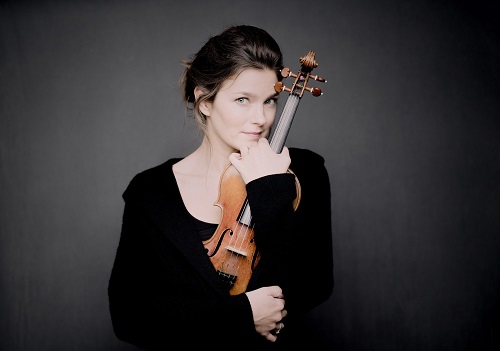 Switzerland Tchaikovsky, Bruckner: Janine Jansen (violin), Philharmonia Zurich / Gianandrea Noseda (conductor). Zurich Opera House, 15.5.2022. (JR)
Switzerland Tchaikovsky, Bruckner: Janine Jansen (violin), Philharmonia Zurich / Gianandrea Noseda (conductor). Zurich Opera House, 15.5.2022. (JR)

Tchaikovsky – Violin Concerto in D major, Op.35
Bruckner – Symphony No.6 in A major, WAB106
Both works in this Sunday morning concert given at Zurich’s Opera House by its opera orchestra, the Philharmonia Zurich, have a connection with Switzerland. The Tchaikovsky violin concerto was written on the shores of Lake Geneva, whilst Bruckner’s Sixth Symphony was composed shortly after the composer had spent a lengthy holiday in the Swiss Alps.
The Dutch soloist Janine Jansen’s sound on her 1715 Shumsky-Rode Stradivarius was divine. In the opening movement, Jansen was at turns delicate and urgent; there was excellent co-ordination at all times between her, the conductor and orchestra. Technically, no holds are barred for Jansen in this concerto, fully the master of slides, double-stopping and continual harmonics. Gianandrea Noseda jumped around the podium, maintaining fast tempi, working the orchestra into a frenzy before the cadenza, which held the audience and orchestra captivated by Jansen’s phenomenal bravura. We all had to catch our breath at the end of the first movement.
The slow movement, Canzonetta, allowed us all to seek repose and wonder at the delicacy of Jansen’s playing. The last movement, Allegro vivacissimo, could not have been taken any faster, both conductor and soloist were fleet of foot. Further frenzy and virtuosity left the audience cheering more loudly than I have ever heard at the opera house, or in a concert hall performance for that matter; a standing ovation was fully deserved. It had been an outstanding performance of a great concerto, and rather overshadowed the Bruckner symphony in the second half. A contemplative Bach encore lowered our blood pressure.
Bruckner’s Sixth Symphony has many musicologists puzzled. It follows the powerful Fourth and impressive Fifth symphonies, and precedes the majestic final three symphonies, and it is rather a lightweight, almost chamber music in style. Bruckner described it as his boldest, cheekiest work. It is a pity that Bruckner’s musical friends never got the chance to revise it.
It was clear from the outset that Noseda was going to deliver it with full volume (a relief after his somewhat restrained Das Rheingold); the brass blew us out of our seats. Grandiose, majestic blocks of brass sound abound in the movement, the intervening passages are – it has to be said – rather weaker, particularly in the puzzling final movement. The Adagio was played beautifully, with plenty of rich, lush strings: Noseda, conducting with great sensitivity and energy, is keeping the qualities of the Fabio Luisi era very much alive in these concert and opera performances. Zurich Opera has clearly struck musical gold yet again.
I enjoyed the Scherzo greatly, with its thrilling climax, though the Trio was rather uninspiring (Bruckner’s fault, not Noseda’s). My attention wandered in the last movement, it is not one of Bruckner’s finest moments. Crude brass outbursts interrupt the quieter passages, which are too simple in construction. Bruckner certainly knew how to write a thrilling ending and Noseda made the most of it, establishing himself as a fine Brucknerian. He had quite a workout.
This lunchtime concert started at 11.15; with an interval, it was gone half-past one by the time we emerged into the hot sunshine. Perhaps management could start these concerts a little earlier, so the audience could enjoy lunch at a reasonable time. (The Swiss, certainly on weekdays, are up at 6 and lunch is at noon). The concert was a sell-out, with many youngsters in the audience, an encouraging sign.
Bruckner seems to be much in fashion these days as Mahler was in the 1960s-1980s; in the coming weeks I will be able to compare Noseda’s interpretation of the Sixth Symphony with Mirga Gražinytė-Tyla with the City of Birmingham Symphony Orchestra at the KKL Lucerne. Then, just a few days later, Christian Thielemann brings the Dresdner Staatskapelle to Zurich’s Tonhalle with Bruckner’s Ninth, and Herbert Blomstedt (an utterly remarkable 95 in July) directs the Tonhalle Orchestra in Bruckner’s Fifth. Luckily, I just adore Bruckner.
John Rhodes